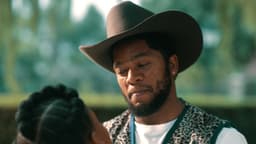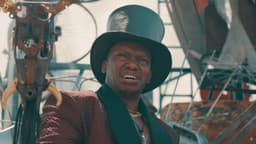
Seyi Babatope on his inspiration for Kabiyesi
Many years before he dreamed of becoming a filmmaker, Seyi Babatope, the director behind the Showmax Original Kabiyesi, had an encounter that would shape the project. His family, which hails from Ilesha, a popular town in Osun State, was invited to dinner by the then Ooni of Ife.
“We went over to his house, and my god, it was gorgeous,” Babatope tells Showmax, still in awe. “I was just completely blown away.”

A young Babatope asked his mother who the man was, why he had white servants, and why his house was such an ostentatious display of royalty. She explained that he was the most important King in their land, and ever since, Babatope has been intrigued by royalty.
He would later discover Orompoto, the only female Alaafin of Oyo, the other powerful King in Yoruba land, which further fueled his fascination with Yoruba kings. Today, he is the man behind Kabiyesi, a historical drama that mirrors Orompoto through Princess Aderiyife, a petulant princess destined to be the monarch in a journey shaped by betrayal, survival, and bloodshed.
Watch the trailer for Kabiyesi
We spoke to Babatope about his inspiration for Kabiyesi, his lead actors, and more.
This interview has been condensed for clarity.
How did you arrive at the decision to make Kabiyesi?
The experience of meeting the Ooni of Ife and seeing how regal and respected he was made the concept of royalty intriguing to me. But the ultimate trigger to pursue Kabiyesi was when I went to The Woman King premiere in Toronto. My friend Jimmy Odukoya was in it.
The film is beautiful and well done, but there are nuances in this story and cultural affinity that they can't access because they don't know it intrinsically. They know all the other things academically or through research, but not from lived experience. That really got me hyper-determined to do something expansive that could really get into the nuggets of who we are as the people of Yoruba tradition and Yoruba mythology.
If Hollywood, as big and powerful as they are, are doing an African story, then we need to tell our stories in a way that can show, dramatically, that there's still some places that you can get to. So we have to take ownership of our story and really tell it as best we can.
Princess Aderiyife is a naive and stubborn girl who’s destined to be a powerful Kabiyesi. What do you like about this character?
Honestly, it was an exploration of what happens when you are called for something you're not prepared for, but you're also driven by an internal force of right and wrong, while being a flawed person. As you rightly said, she's extremely stubborn. She's naive and doesn't know enough, yet she keeps jumping to conclusions. These are not attributes of a leader; they are the attributes of a petulant, spoiled child.
By virtue of her upbringing, she is spoiled royalty. She is her doting father's child. She gets everything that she wants. No one would look at her and think of a leader, but when injustice happens, it changes something within her. Her motivation seems to be driven by the right thing: she’s thinking, “my father has passed away on the most special of days for me. And it was a coup d'etat. Somebody planned this. Now my brother, who has protected me, I see him lose his life, and you tell me I should just ride off into the sunset and forget where I come from?”
And when you think of the complexity of also being a woman, and how tradition dictates customs, it's like, well, you don't really have a place to play in this situation. The best thing for you to do is just go and have a bunch of kids and keep it moving, but she's like, “no, this is not the option that I'm going to take. As much as I don't know what I'm doing, I know that what you're saying is wrong, and it doesn't sit well with me to let this happen.”
I thought that makes for an interesting character exploration for a dramatic series.
What sort of research has gone into understanding the nuances of the time, in terms of even clothing and language?
This was truly a very difficult ordeal, but everything was done with the sole purpose of serving the essence of the story and these people - who they were and how they lived. We had to look for all these details so we could envision what their lives would have been like and what type of technology they had access to.
Like, what was fashion like for them? Where were the aristocrats in society? How did the commoners move in society? What's the architecture like? How did they wash their clothes? Were clothes even used as a determinant of status, or were they just an outcome of the functionality of what anyone did for a profession?
So, a lot of the research that all the various heads of departments did, with me being at the centre of it all, was really driven by that one goal: to arrive at the consensus of our best approximate rendition of what life must have been like at this particular time.
What is something that struck you while researching for the show that blew your mind regarding Yoruba history and our mythology?
Yoruba culture is complex and detailed. There's almost nothing they haven't thought about. Even in the concept of Kabiyesi as a show, the Oyo Mesi is essentially your cabinet. It has your Minister of State; Balogun is your Minister of Defence.
You start to really see the structures and systems of governance that the people we think of as being from the olden days had in place. These were not dummies. These were very smart people. These are people who understood the importance of governance in its many different functions and many different offices and how those funnel up all the way to the Kabiyesi.
What was wrong with these systems if they allow men like Adetoro to happen?

My mother used to tell me, for every action, there is an equal and opposite reaction. Power, whatever form it has, has a way of creating different types of opposition to it. And there are still systems that are run by men, who are fallible and have different passions that drive them. Men like Adetoro are really just a byproduct of the balancing factor to power that seems to be absolute. There are always going to be men who exist outside the confines of what society wants things to be, who are going to take the contrary view or the dangerous view in pursuit of their desires.
In Adetoro’s case, he was promised something that wasn't given to him, and he thought the only remedy was scorched earth. “If I can’t have it, let the whole world burn, and I don't care who burns with it. You've taken what belongs to me.” So, men like Adetoro are natural byproducts of authority, and they exist in many forms. Sometimes, they don't get to really find the right avenue to express their disdain or what they feel they've been denied. But in Adetoro's case, he was able to put it all together and make his very bold statement and say, “Well, if you won't let me marry your daughter, then I'll be king.”
How did you land your lead actors, Dr Annetta Adebusuyi and Jide Ibitoye?
The audition process was a blessing to find these wonderful actors and talents. I am so proud of them and grateful to them for giving themselves and their gifts to the show because they were truly committed people to the entire process. They never complained. They were always committed and dialed in.
Jide walked in, and it was like, “Holy crap, who is this person?”
As he walked in, I thought, “Okay, this guy is awful!” - not Jide, the actor. As he was acting, I could feel like I didn't like Adetoro at all. He was so unlikable and awful. His speaking voice and his acting voice are not the same.
There were casting directors with me who were making notes, but I just put him on my list: “It's him! Let's keep that moving. Unless someone's going to walk in this room and be better than this guy…” because he was that awful in just one scene. He hadn't even read the script. All he had was one scene that he performed. I thought, “What if this guy now reads the script? What kind of level of texture will he put onto this character, and how would he really construct this thing?”
And Dr Annetta?
For Dr Annetta, the only way I can describe finding her is, when Jesus says yes, nobody can say no. Because the thing about casting a movie is if anyone will make a film and the choice they have in front of them is the character of the actor or personality, choose character every time. With Dr Annetta, whatever you're experiencing watching her from episode 1 to 5, whatever you see when you watch her - she is that, she gave that and more. She was locked in. She was committed.
I have worked with some pretty gifted actors in my short career. She ranks at the top. Locked in. This woman was prepared. Even for the first two weeks, I didn't talk to her. I didn't say anything to her at all because I would take one look at her, and I'd think, “Nah, man, whatever this woman has prepared, you just shoot that. She's ready. Anything you do now would mess with her.” She came locked in, and she stayed locked in up until the very last day, and she was an absolute treasure to find.
I think in our business of Nollywood and Nigerian cinema and Nigerian dramatic arts, we need more people like her.
New episodes of Kabiyesi land every Friday on Showmax until 18 April 2025.
More like this

Jojo on The Real Housewives Ultimate Girls Trip: Africa reunion, social media backlash and more
Jojo opens up about the highly anticipated reunion for The Real Housewives Ultimate Girls Trip: Africa, coming to Showmax on 20 and 27 February.

South Africa’s stories and storytellers recognised as SAFTA nominees announced
Mzansi’s boldest stories take centre stage as the 2026 SAFTA nominees are unveiled, with a wave of nominations across DStv and Showmax.

The ‘Burbs S1
In this adaptation of the 1980s Tom Hanks dark comedy, a couple moves back to the husband's hometown, only to face a cul-de-sac shrouded in mystery.

“You don't create something so powerful purely through military tactics” - Shaka iLembe co-creator
Shaka iLembe co-creator Desireé Markgraaff reflects on the vision, research, and importance of telling our stories. Stream Seasons 1–2 on Showmax.

Where to see the cast of Shaka iLembe S1-2 on Showmax
From Nomzamo Mbatha as Queen Nandi to Lemogang Tsipa as King Shaka Zulu and Thembinkosi Mthembu as King Dingiswayo, see the cast of Shaka iLembe in some of their other acclaimed roles on Showmax. Binge now on Showmax.

MaBlerh to host the first-ever The Real Housewives Ultimate Girls Trip: Africa reunion
MaBlerh will host the first-ever reunion for The Real Housewives Ultimate Girls Trip: Africa, set to air in two parts in February 2026.

Shaka iLembe S1-2
Set in the 1700s, Shaka iLembe tells the story of the making of the iconic African king. All episodes are now available to binge.

Six Taylor Sheridan series while we wait for The Madison
Excited about The Madison coming in April? We’ve rounded up all the Taylor Sheridan series you can watch on Showmax while we wait.
Outlaws, now streaming on Showmax
Go on holiday with RHUGT: Africa
More West African hits to stream

Where to watch The Real Housewives franchise online
Showmax is the home of The Real Housewives, giving an inside look at the lives of these glam women from Durban, Abuja, Lagos, Joburg, Nairobi and more. Plus, go on vacation with The Real Housewives Ultimate Girls Trip!

Wizkid: Long Live Lagos (2025)
This intimate and uplifting documentary explores Grammy-winning Nigerian artist Wizkid's rise to superstardom as one of the biggest Afrobeats artists.

Princess Jecoco on The Real Housewives Ultimate Girls Trip Africa
Princess Jecoco from The Real Housewives of Abuja franchise is back! She opens up on what it feels to be part of an epic girls trip

Dr. Catherine speaks on flying the Kenyan flag and reuniting with Zena on The Real Housewives Ultimate Girls Trip - Africa
Dr C opens up about representing Kenya in RHUGT–Africa, reuniting with Zena in Brazil, healing through therapy, and revealing a fun new side.
Latest Stories

Schalk Bezuidenhout trades stand-up for 9-5 in Die Kantoor

A heartbreaking loss: Nolwandle Biyela’s final stand in Outlaws Season 2

Fall in love with romantic drama Touch, now on Showmax

Antonie Marx on Volspoed and why it's a must-watch

Sandra Stein makes her debut on Law, Love and Betrayal S2

Albert Pretorius on Die Kantoor, SA’s re-imagining of The Office

20+ addictive South African reality shows to stream

Where to watch The Real Housewives franchise online

How to Train Your Dragon: Bringing Hiccup and Astrid to life

What to watch on Showmax in January 2026

7 things to know about indie award-winning movie Dìdi

Mission: Impossible – The Final Reckoning’s South African stunts

Die Kwiksilwers (2024)

Where to see the cast of Mpondoland on Showmax

Angel on The Real Housewives Ultimate Girls Trip, Jojo and more

Thandolwethu Zondi on his new role in Outlaws S2
Must-watch trailer for Showmax's turbo-charged reality series Volspoed

The Real Housewives Ultimate Girls Trip cast on first impressions, beefs and more

Fana Mokoena on playing a sangoma in Masinga

Princess Jecoco on The Real Housewives Ultimate Girls Trip Africa

Tlali returns: Outlaws’ most loved and hated villain is back

Novocaine: the US box office hit shot in Cape Town

Why Jackie Phamotse says Slay Queens is a must-watch

Evodia on Ultimate Girls Trip Africa and her return to reality TV







